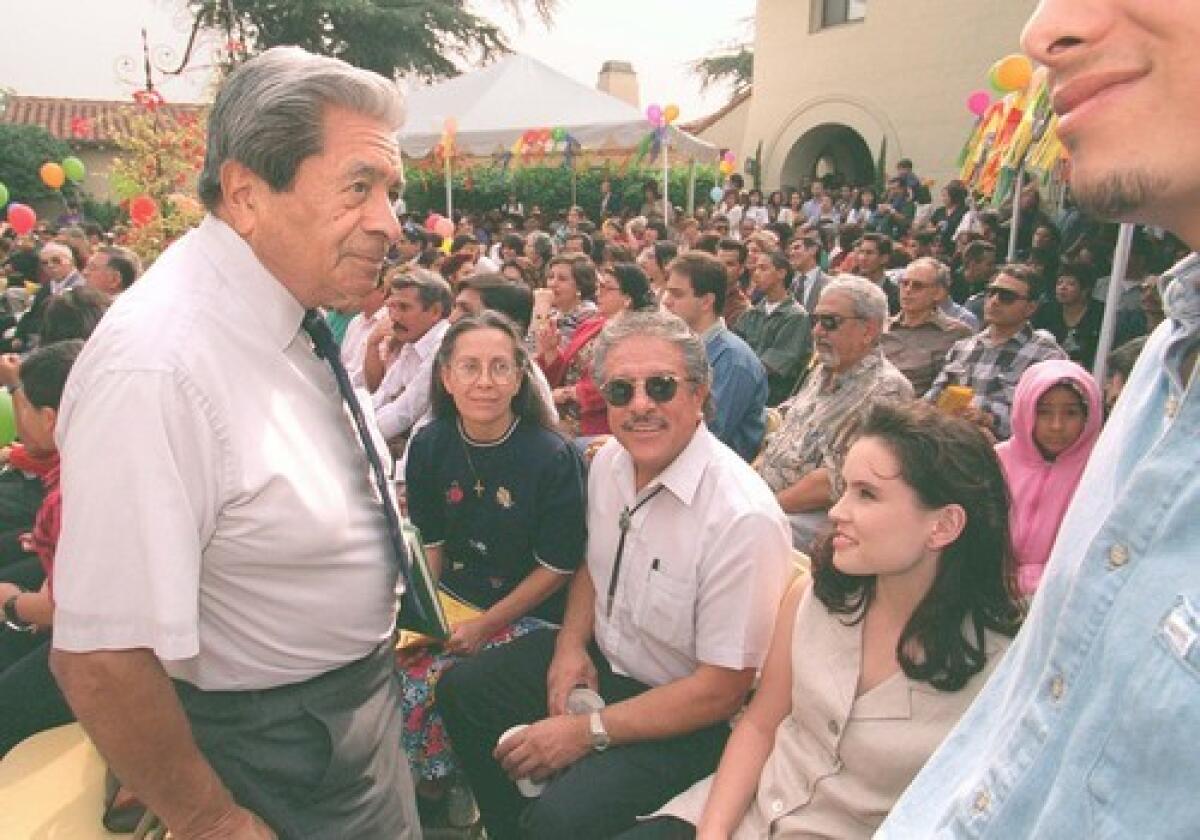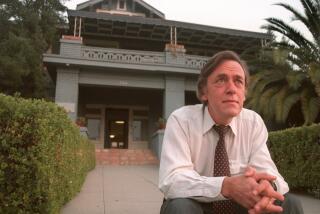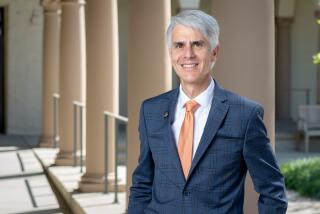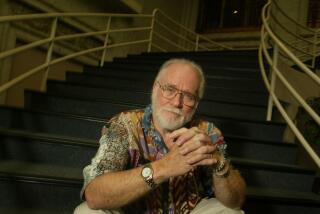Martin Ortiz, founder of Center of Mexican American Affairs, dies at 89

Martin Ortiz, who inspired thousands of Latino students to reach for college and earn degrees as the founding director of Whittier College’s Center of Mexican American Affairs, has died. He was 89.
Ortiz, who had Parkinson’s disease and pneumonia, died Monday at an assisted living facility in Whittier, according to Alex Tenorio, a longtime friend.
Soft-spoken but tenacious, Ortiz was an institution on the Whittier campus who was affectionately known as “El Jefe” (the boss) or simply as “Dad” for his dedication to recruiting Latino students, guiding them through the application process and helping them obtain scholarships, grants, internships and jobs.
Many of the students he helped enroll were the first in their families to attend college.
“Martin really had an impact on people. He pushed education. That was the message of his whole career,” said William Estrada, a former assistant dean of Occidental College who is now curator of the Natural History Museum of Los Angeles County.
Ortiz founded the Center of Mexican American Affairs in 1968, when few institutions of higher learning were reaching out to Latino youths. Over the decades of his advocacy, Latino enrollment at Whittier College, President Nixon’s alma mater, grew more than fivefold to its current rate of 28%, among the highest in the nation for private four-year colleges and universities.
“He was a pioneer in the promotion and operation of programs geared to helping Latinos move on to college and succeed,” said Antonio Flores, president of the Hispanic Assn. of Colleges and Universities, a San Antonio-based group that promotes Latino success in education.
Ortiz’s own road to college was strewn with bumps. Born Nov. 11, 1919, in Wichita, Kan., he grew up in poverty in a family of 12 children.
His mother died when he was 4, but he was close to his father, who rode with Mexican revolutionary Pancho Villa and never attended school, “not even for one day,” Ortiz told the Los Angeles Times in 1994.
Although Ortiz went to school in Wichita, he was so unassimilated that in eighth grade he still knew little English. He never forgot the day a cruel teacher pinned a note on him that made his classmates point and jeer. The note read, “I am retarded.”
He did not know what the note said until much later, “but I know that I didn’t cry,” he recalled in the interview in The Times. He resolved “to never let that happen to anyone again.”
One piece of advice he often gave students decades later may have been rooted in that experience. “Don’t cry -- qualify” became a favorite Ortiz slogan.
Some years would pass before Ortiz practiced what he would later preach. At 13, he dropped out of school and started riding the rails with two friends.
“We became hobos for 3 1/2 years,” he said.
He worked in the fields, harvesting sugar beets, potatoes, apples and cotton. He learned to speak English.
When he tired of drifting, he returned to Wichita and entered high school, where he was one of three Latino students. In his senior year he was elected student council president, the first Latino in his school to hold the position.
He had no intention of pursuing college, but an Anglo classmate viewed his prospects differently. One morning the friend pulled Ortiz out of bed and took him to Wichita’s Friends University, founded by Quakers in 1898. The friend gave him a clean shirt to wear to registration, and three other friends pitched in to cover the $200 tuition. Later, they tutored him, too.
World War II intervened, and Ortiz left the college after one semester to join the Marines in 1942. He served in the South Pacific as an aerologist and language specialist.
After the war, he moved to California and went to Whittier College on the GI Bill because he was interested in its YMCA management program.
Although he was a veteran who had served his country, he found Whittier unwelcoming. Barbers, restaurants and landlords turned him away. On his first day at Whittier College, where he was the only Latino in his class, a stranger eyed him suspiciously and asked, “Where do you think you’re going?” Ortiz quietly replied, “To get an education.”
After earning a sociology degree in 1948, he moved to Chicago, where he enrolled in a master’s program at George Williams College (now Aurora University), taught Spanish at a YMCA and founded the city’s Mexican American Council. He received his master’s degree in 1950.
In 1958, he returned to Whittier College to teach sociology. Ten years later he launched the Center of Mexican American Affairs to provide support for Latino students, who by then comprised 5.5% of Whittier’s enrollment.
Through the center he coordinated an array of support groups, including the Hispanic Students Assn., the Hispanic Parents Advisory Council, the alumni group Alianza de Los Amigos, and business advisory groups. He launched an annual tradition at the school: the tardeada, an afternoon reception held each fall to celebrate Latino culture and recognize Latino students and their parents.
The tardeada and other cultural events plus an orientation for Spanish-speaking parents have been named the Ortiz Programs in his honor.
Ortiz considered his involvement with parents crucial because many of them, like his own parents, had prodded their children to get jobs instead of an education.
“They’re conditioned by the past,” Ortiz said some years ago. “I tell parents that college is the future and their children belong in it.”
Twice married, Ortiz is survived by his wife, Linda.
A memorial service will be held Jan. 25 at 2 p.m. at the Ruth B. Shannon Center at Whittier College, 13406 Philadelphia St., Whittier, CA 90608. Memorial donations may be sent to Whittier College for the Martin Ortiz Endowed Scholarship.
More to Read
Start your day right
Sign up for Essential California for news, features and recommendations from the L.A. Times and beyond in your inbox six days a week.
You may occasionally receive promotional content from the Los Angeles Times.







